Photographs: Uttam Ghosh/Rediff.com Ajay Tyagi and Munish Shekhavat in New Delhi
For India's healthcare industry, expected to double to $100 billion by 2015, this year was marked by expansion and consolidation as well as painful moments of the Kolkata hospital fire.
Besides, there were irritants like the move to impose the 'misery tax' on the sick.
Major chains like Fortis and Apollo continued expansion to cash in on the ever increasing lifestyle-related health issues, coupled with improving insurance reach, government initiatives and improving incomes.
. . .
Healthcare: Of misery tax, expansion and tragedy
Photographs: Uttam Ghosh/Rediff.com
Max Healthcare, meanwhile, sold off 26 per cent stake to South Africa's Life Healthcare Group for Rs 516.5 crore (Rs 5.165 billion).
It was not the best start to the year for the private healthcare providers, with Finance Minister Pranab Mukherjee deciding to impose 5 per cent service tax on treatment in air-conditioned hospitals with more than 25 beds paid either by individuals, insurance firms or companies.
Miffed at this Budget proposal, the industry called for the removal of the tax, which they termed as 'misery tax'. Mukherjee, finally, rolled it back.
. . .
Healthcare: Of misery tax, expansion and tragedy
Photographs: Uttam Ghosh/Rediff.com
The year, which could have well been remembered as the one in which all the major private players went for expansion and consolidation, was blotted by the fire tragedy at the AMRI Hospital that took 93 lives.
One of the biggest hospital fire tragedies in India, the AMRI incident put a question mark on the ways of management of healthcare facilities by private players and failure to comply with the safety norms.
Nevertheless, 2011 was a year when Fortis Healthcare went in for consolidation of its domestic and global operations.
. . .
Healthcare: Of misery tax, expansion and tragedy
Photographs: Uttam Ghosh/Rediff.com
Fortis Healthcare India agreed to pay $665 million (around Rs 3,270 crore) to acquire Singapore-based Fortis Healthcare International Pte from a firm owned by the promoters.
Post-consolidation, Fortis boasts of over 74 hospitals, with more than 12,000 beds, 580 primary care centres, 188 day care speciality centres, 190 diagnostic centres and a base of over 23,000 employees.
Fortis also entered new verticals with the setting up of standalone dialysis centres under the brand name, 'Renkare'.
. . .
Healthcare: Of misery tax, expansion and tragedy
Photographs: Rediff Archive
It announced plans to set up 50 such centres across the country over the next two years for kidney patients.
Moreover, it forayed into robotic surgery through a joint venture with International Centre for Robotic Surgery, saying it will invest up to Rs 150 crore (Rs 1.50 billion) to set up around 10 robotic surgery centres across India within two years.
Fortis rival Apollo Hospitals group concentrated on expanding capacity during the year and said it would add 500 beds by the end of this fiscal, taking the total strength to over 9,000 beds.
. . .
Healthcare: Of misery tax, expansion and tragedy
Photographs: Uttam Ghosh/Rediff.com
The group is adding 2,000 beds over two years and has initiated share sale to qualified institutional buyers to raise Rs 330 crore (Rs 3.30 billion).
The company is also mulling setting up three medical colleges in the next five years as part of plans to expand the medical education venture.
The Chennai-based healthcare chain is already operating 11 nursing and hospital management colleges. It has 1,200 pharmacies and over 100 diagnostic clinics across the country.
. . .
Healthcare: Of misery tax, expansion and tragedy
Photographs: Reuters
Besides selling off 26 per cent stake in the healthcare business, the year also saw Max India founder Chairman Analjit Singh come out with a succession plan. He stepped down as the Managing Director and appointed a professional, Rahul Khosla, for the position.
Later, the healthcare provider also came out with a new management team, including a new CEO in Ajay Bakshi, to take over the reigns of Max Healthcare from Pervez Ahmed, who resigned earlier.
It also launched three super speciality hospitals, the first two in Mohali and Bhatinda, under the public private partnership (PPP) model, and at Shalimar Bagh in Delhi.
. . .
Healthcare: Of misery tax, expansion and tragedy
Photographs: Reuters
With ratings agency Fitch predicting that the Indian healthcare industry will double its size to $100 billion by 2015, even smaller players like Manipal Hospitals have decided to go in for expansion.
Similar was the case with diagnostic labs, including Super Religare Laboratories (SRL), Dr Lal Path Labs and Metropolis.
The country's leading diagnostic chain SRL plans to invest up to Rs 100 crore (Rs 1 billion) to set up 25 laboratories both within and outside the country by the end of next fiscal. It has said it is ready for the listing process but is waiting for the promoter's nod.
. . .
Healthcare: Of misery tax, expansion and tragedy
Photographs: Reuters
Similarly, Dr Lal Path Labs plans to add up to 15 centres though organic route and another 10-15 through acquisitions to take the total tally to 100 centres in the current fiscal.
Despite some forgettable moments, 2011 was a year when the healthcare industry got on to the path to cash in on the opportunities expected to come along the way as the government has proposed to increase expenditure on health to 2.5 per cent of the GDP during the 12th Five-Year Plan, from 1.03 per cent.
Understandably, a FICCI Hosmac report has predicted that the sector will become a $280 billion industry by 2020.


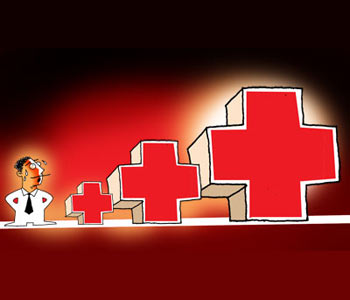


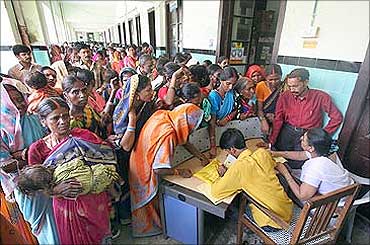

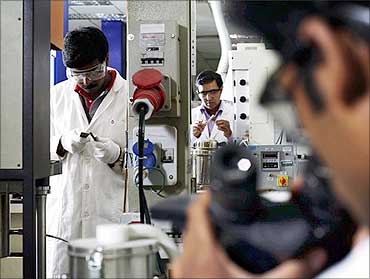
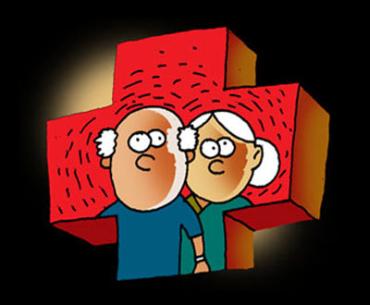
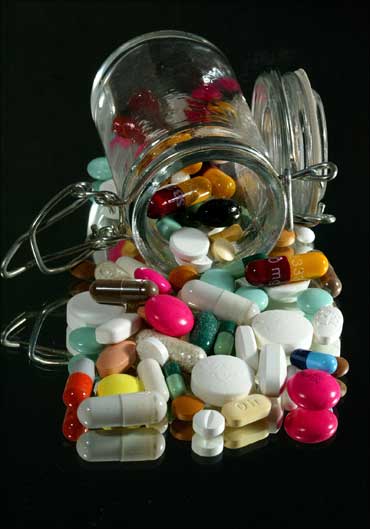
article